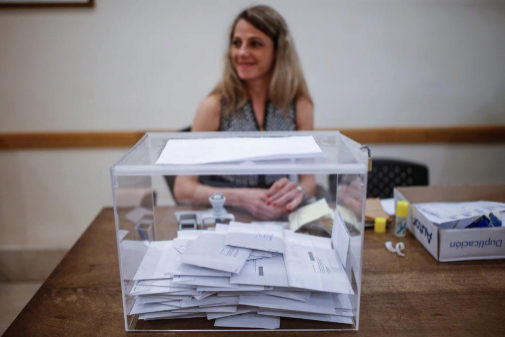- Elections 2019: The polls today measure the tiredness before the misgovernment
- 10-N. The Electoral Law provides for sentences of up to three years in prison for obstructing the vote or access to schools
- Surveys: This is how the polls of the 10-N general elections have remained
- General elections. Cristina Island, 'zero zone' of abstention
April 28, 2019, 37 million Spaniards were called to the polls to renew the 350 seats of the Congress, the 208 of the Senate and elect president; November 10, 2019 , history repeats itself. Yes, Spain returns to vote 8 months after that 28-A in which the PSOE and its leader, Pedro Sánchez , was the most voted party, but unable to reach an agreement for the formation of a progressive government with United We can.
All parties have claimed the vote to overcome the paralysis in the shortest campaign of democracy. The biggest fear of this appointment with the polls lies in abstention , in an election day that will be marked, in addition, by cold and rain.
With the protests recorded in recent weeks in Catalonia against the sentence of the process , much of the attention is focused on that autonomous community, but the Government has wanted to send a message of tranquility and normality. According to data provided on Saturday by the Executive, the security device for 10-N is made up of about 93,000 troops : about 29,000 national police , 46,000 civil guards , 4,300 regional police and 13,300 local police .
08.40: The cost of other elections
The repetition of the elections has forced the Government to approve a budgetary modification to be able to pay the expenses of the electoral machinery for the 10N, with a cost that approaches 136 million euros , a figure similar to that of the April generals.
This will be 520 million spent from December 2015 until now in the four general elections held, three of them anticipated: about 130 million elections in 2015 and as many in 2016, and almost 135 and 136 million, respectively, those of this year.
08.30: The keys of 10-N
Violent demonstrations in Catalonia, the exhumation of the remains of Francisco Franco, the strength of Vox, fragmentation and political instability ... These are the keys to this Sunday's elections, the fourth in four years.
Keys
- Catalonia
After years of presuming its peaceful character, Catalan separatism has undergone a turn with the riots in Barcelona and other cities, after the Supreme Court issued the procés sentence.
- Vox factor
The instability in Catalonia has, according to the polls, a beneficiary: the extreme right-wing party, Vox, which entered the lower house of Parliament with 24 deputies, out of a total of 350, and which the polls place as third political force.
- Frank
Sanchez was somewhat noted when he exhumed the remains of the dictator Francisco Franco of the Valley of the Fallen, the mausoleum where he rested since his death in 1975, to re-smoke them in a discreet pantheon of the family. However, Fernando Vallespín, political scientist and former president of the Center for Sociological Research (CIS, public), believes that it will not weigh only in the elections and therefore "will not have the effect that the government, optimistically, thought it would have ".
- Fragmentation
The traditional PP-PSOE bipartisanship flew through the air in 2015, and since then the fragmentation has only accentuated. In the conservative field three parties concur: Citizens, Vox, and a PP in strong ascent that according to Vallespín has the "possibility of having the useful vote of the right", strengthened in general by the crisis in Catalonia.
- Instability
With the Spanish policy immersed in a logic of blocks, the surveys predict the risk of a new situation of paralysis, in which neither PSOE, Podemos and Más País would add, on the one hand, nor PP, Citizens and Vox, on the other.
08.15: Sánchez e Iglesias, the early risers
The candidates of the PSOE, Pedro Sánchez , and of Podemos Podemos, Pablo Iglesias , will be the earliest at the time of voting, as they have announced that they will exercise their right to vote at 9.30 am in the morning. At that time, the socialist leader and president of the acting Government plans to deposit his ballots at the Volturno Cultural Center of the Madrid town of Pozuelo de Alarcón, the same place where he will do it an hour later, at 10.30, the president of Citizens, Albert Rivera .
At the same time that Sánchez, the leader of Podemos, Pablo Iglesias, will cast his vote at the Public School La Navata (Galapagar, Madrid), while the PP candidate, Pablo Casado , will vote at 10.00 at the Colegio Nuestra Señora del Pilar , from Madrid.
For his part, the president of Vox, Santiago Abascal , will do so at 1:00 p.m. at the Colegio Pinar del Rey , also in the capital of Madrid, and the leader of Más País, Íñigo Errejón , at 10:30 at the Colegio Santa Teresa de Jesus of Madrid.
According to the criteria of The Trust Project
Know more- General elections
- Politics
- Spain
- Vox
- PSOE
- PP
- Pablo Iglesias
- Pedro Sanchez
- Citizens
- More Country
- United We Can
- Pablo Casado
- Iñigo Errejón
- Albert rivera
Spain Pedro Sánchez will consider bringing the proposal to outlaw the independence parties to the Constitutional
Spain Albert Rivera charges against the PSC: "It is a nationalist party" and "the main obstacle to a transversal agreement" with PP and Cs
SpainThe policy debate demonstrates the difficulty of the left pact

